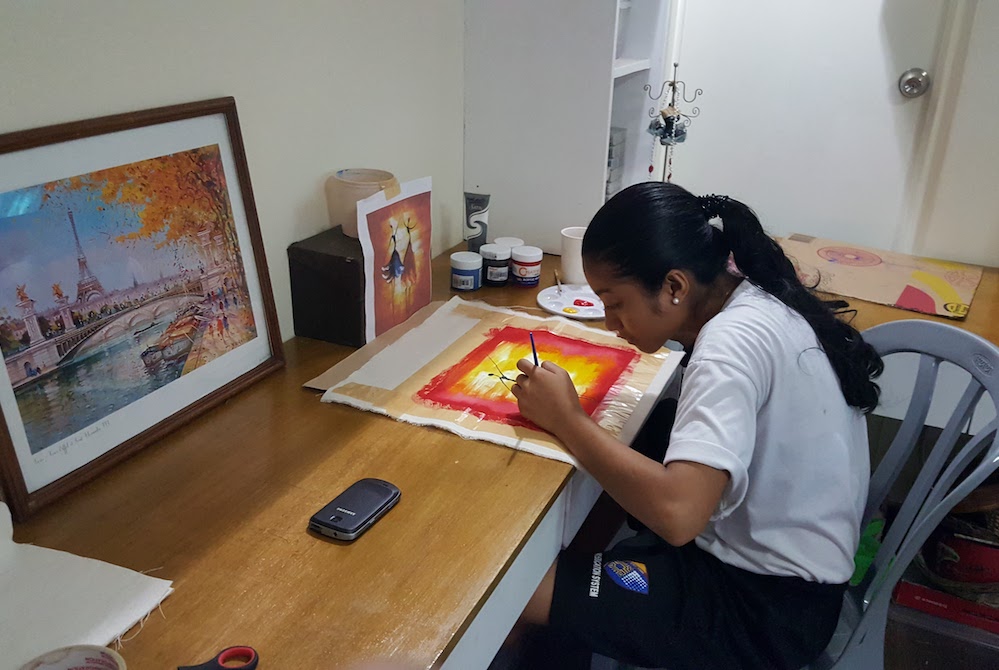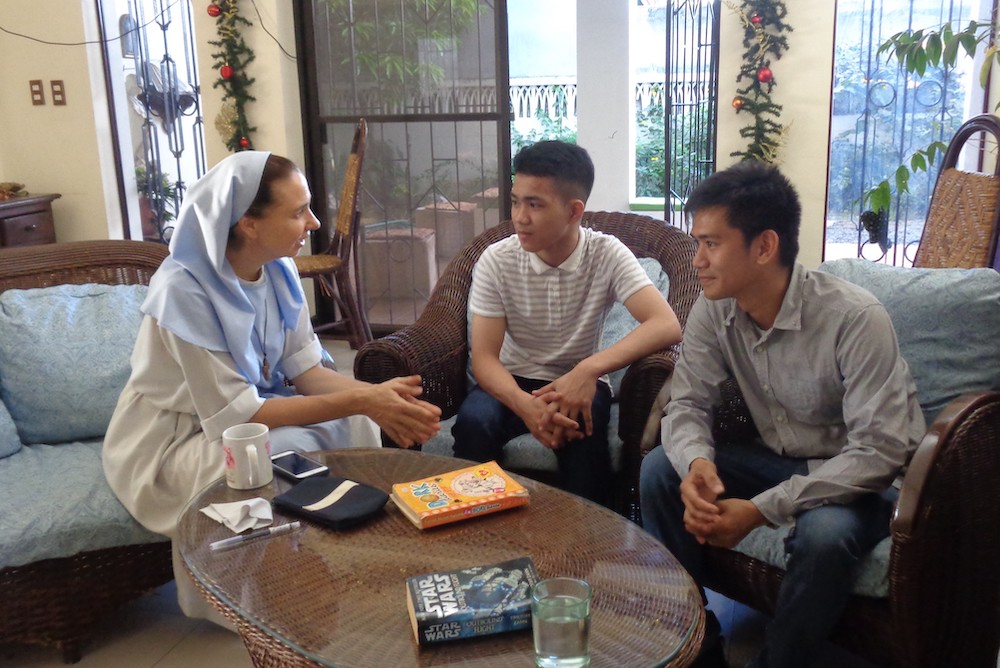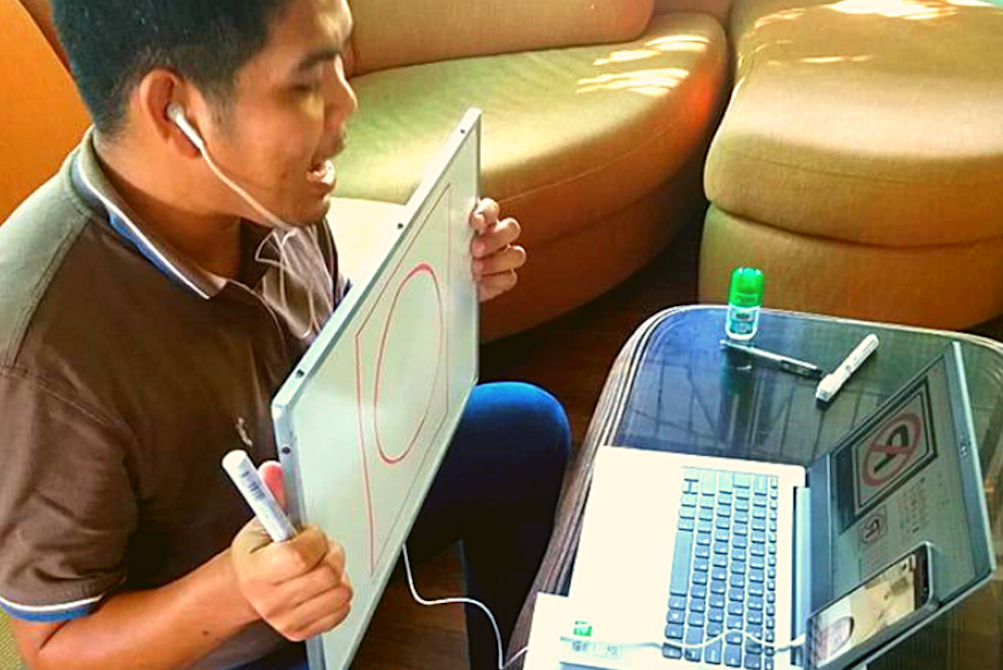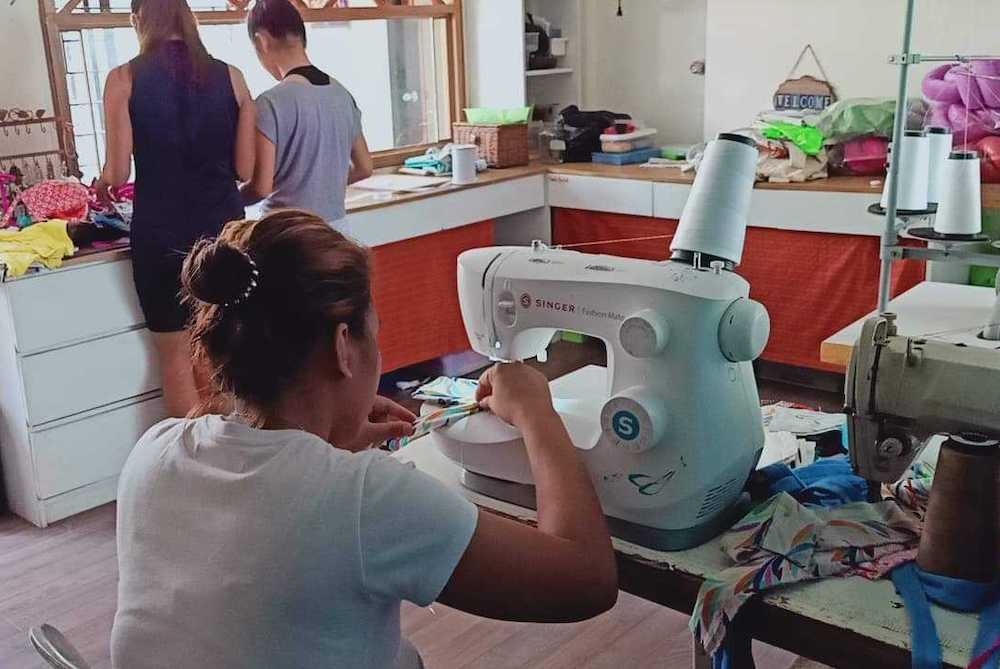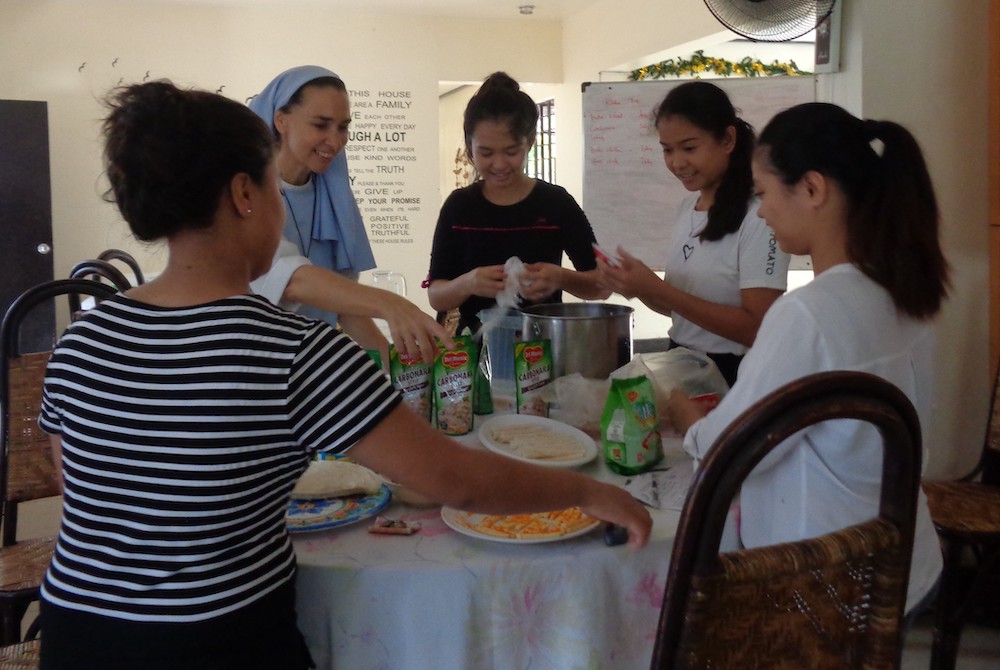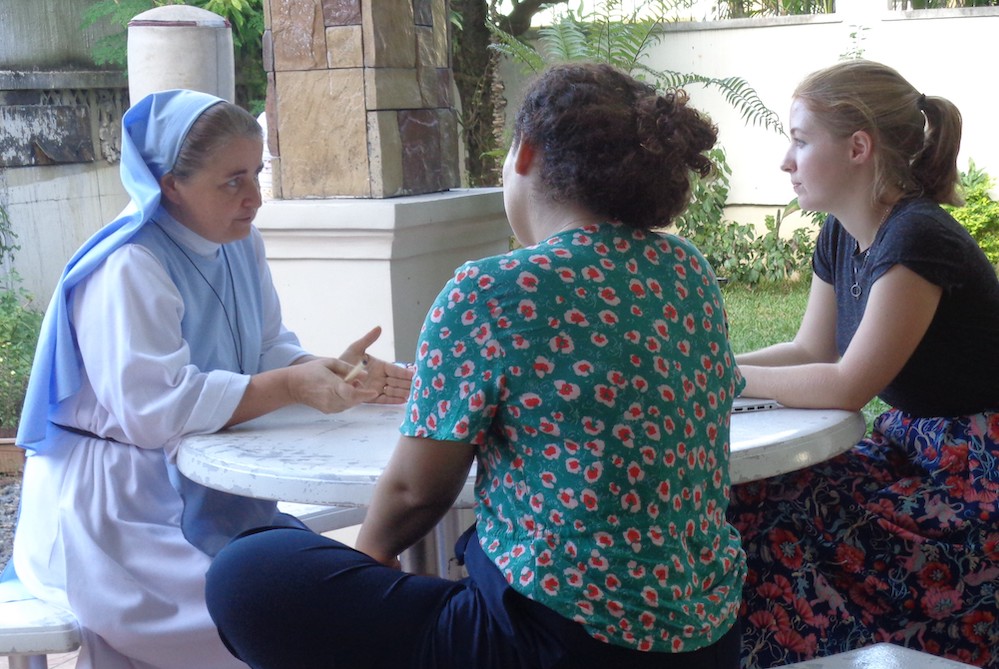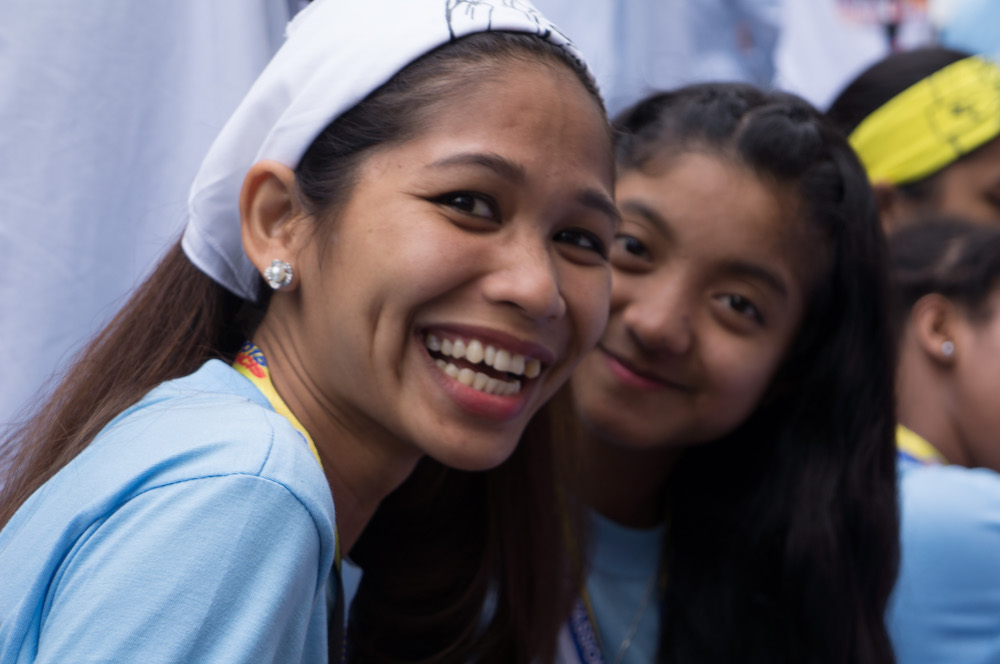
Jane Ollivier, pictured at left in 2015, entered the School of Life at age 15 after being orphaned and passed around various relatives. While living at the School of Life, she earned an education degree, taught school and now works as a home life officer for ACAY to help other teen girls. (Courtesy of the Missionaries of Mary)
Jane Ollivier lost her parents by the age of 10. For five years, she bounced around between various relatives before she entered the School of Life, a residential program for teenage girls in metropolitan Manila run by the Missionaries of Mary.
"I wasn't treated as a child who needed help, but as a member of a family," she said. "I found the care of a family that I was looking for."
In her three years in the program, Ollivier earned an education degree. She taught school for a year before returning to the School of Life as the home life officer to help other girls learn to be self-sustaining.
The sisters "gave me a foundation of what real life was like," said Ollivier, now 30.
The School of Life is one of the central programs of Association Compassion Asian Youth, or ACAY. For more than 20 years, the association has focused on providing the support, skills and structure to change the lives of troubled teens and young adults in the Philippines.
The School of Life, founded in 2000, provides a home for around 20 girls between the ages of 14 and 21, many of whom were abused. The program helps them with school or vocational training and teaches practical life skills to help the girls become self-sustaining, such as budgeting and managing a house, planning meals and shopping. The girls also can earn money by doing administrative tasks for the program and making and selling crafts.
The Second Chance program for teen boys who are in detention centers began in 2002 and also emphasizes personal development, such as through anger-management classes, and vocational training to enable participants to get jobs in construction and other skilled trades once they are released from detention.
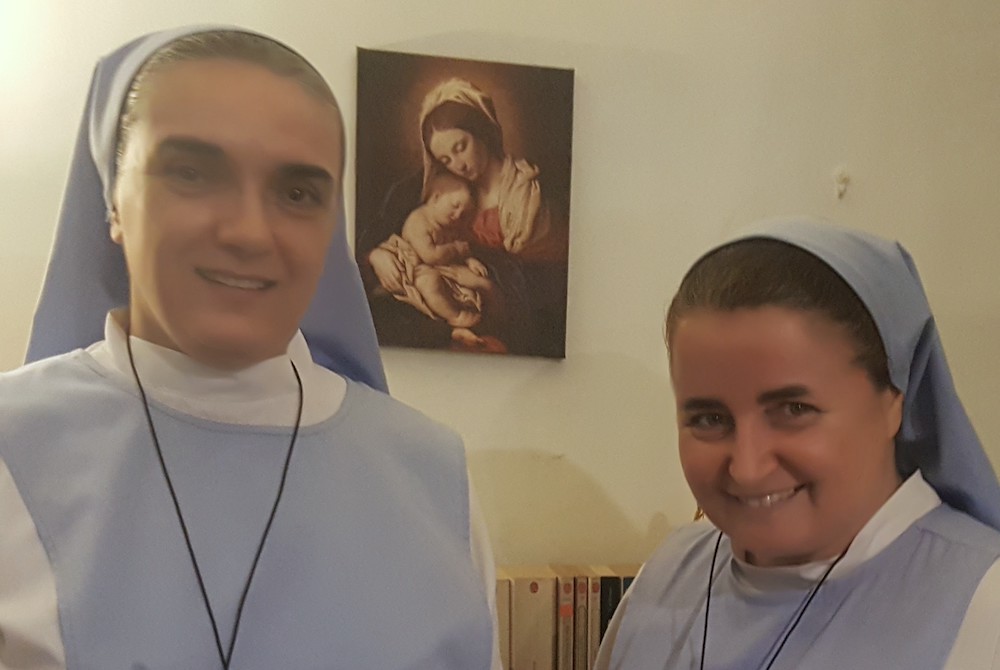
Sr. Edith Fabian, left, and Sr. Sophie de Jésus, pictured in November 2017, are two of the four Missionaries of Mary sisters at the heart of the School of Life and Second Chance programs. (GSR photo/Gail DeGeorge)
ACAY is the brainchild of Sr. Sophie Renoux, who prefers to be known as Sr. Sophie de Jésus. In 1995, the French sister heard a call to help children in the Philippines after she participated in World Youth Day in Manila as a member of the Community of the Beatitudes. She moved to the Philippines from France two years later.
There, she found few programs to help teens, so she and Sr. Edith Fabian, a Hungarian sister Sister Sophie knew through the Community of the Beatitudes, founded Association Compassion Asian Youth in 1997. Over the years, they were joined by Sr. Laetitia Gorczyca from Poland and Sr. Rachel Myriam Luxford from New Zealand, who were also members of the Community of the Beatitudes. Together, they founded the Missionaries of Mary, a diocesan community, in 2007.
Now, the programs are models for other organizations in the Philippines as well as similar programs in other countries. A Second Chance program began in Marseille, France, in 2014. Members of a nongovernmental organization in the Democratic Republic of Congo have welcomed ACAY staff in Kinshasa for training and have gone to the Philippines to find aspects of the School of Life to incorporate into its program for teenage and young women.
Girls are referred by nongovernmental organizations and detention centers or after they age out of other social service programs; boys are referred through social workers, counselors and other staff at the detention centers. After they leave the program, the women tend to work at offices or as teachers or nurses, and the men become carpenters or entrepreneurs or work in the field of social development. Most alumni return to speak with the young men and women still active in the program.
Advertisement
A caring, family-like atmosphere is fundamental for the teenagers, Sister Sophie said. The sisters, staff and volunteers offer encouragement, counseling and support.
"Emotionally, I had people I could lean on," Ollivier said. "The sisters gave me that motherly care I was looking for. They're not just there to give you the basic needs, but they are there to give you everything that you need to empower you as a woman."
Raymart Montinola credits the sisters with helping him change his life. He was in a detention center at age 18 when a social worker referred him to the Second Chance program.
"I felt hopeless," he said. "I had no skills. I couldn't get a job."
The sisters helped him get an apprenticeship in furniture-making. When he was inspired to start his own business, the sisters loaned him money for machinery and helped him find clients. Now in business for more than a year, he is supporting his wife, who was in the School of Life program, and their two children.
"I learned a lot, and I'm thankful because they're still there, even if I'm not in any program now," said Montinola, now 30. The sisters "continued to give me opportunities, give me wings so I could fly."
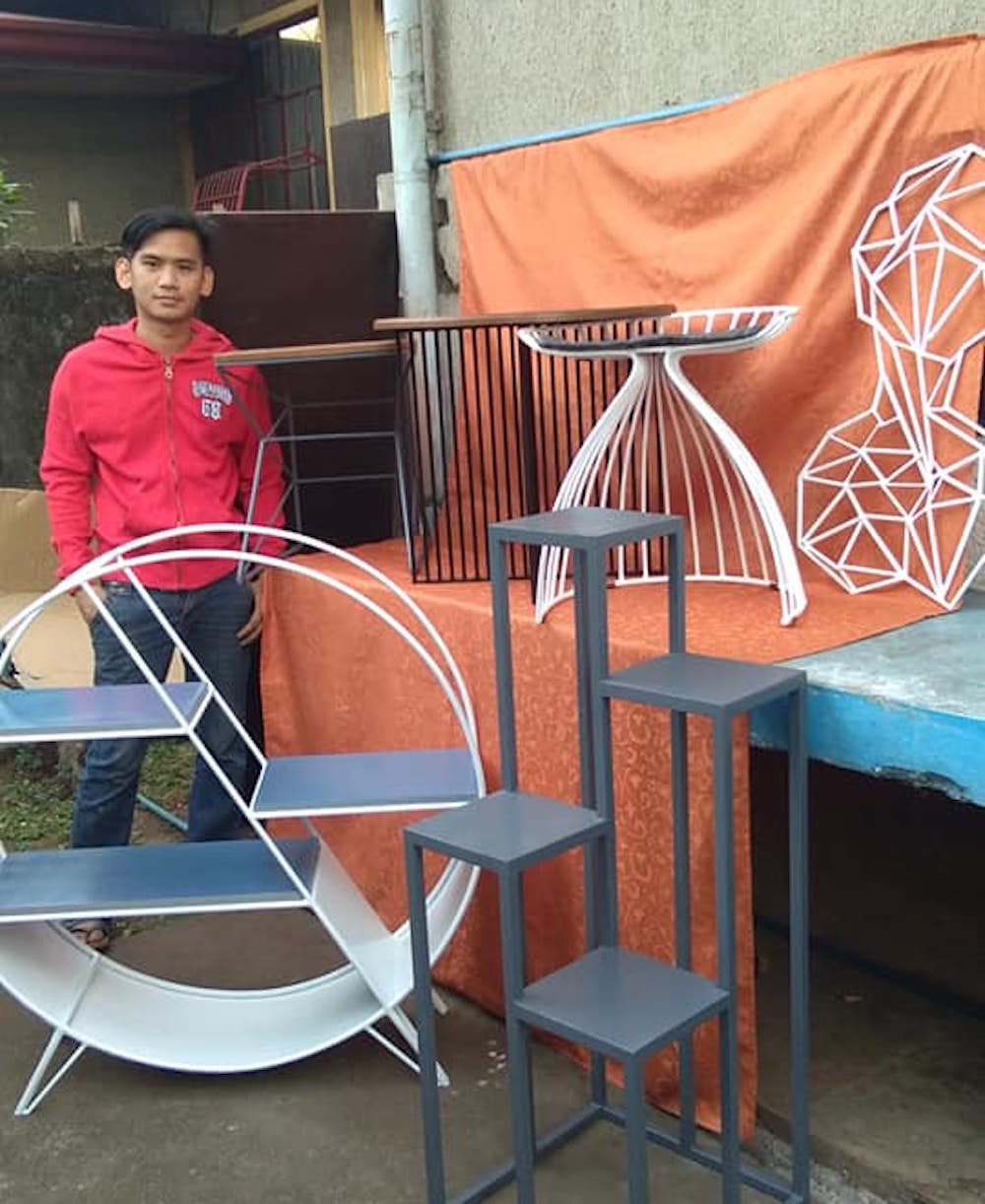
Raymart Montinola started his own furniture-making business with a loan from the Missionaries of Mary after he completed the Second Chance program. (Courtesy of the Missionaries of Mary)
Persistence despite a strict pandemic lockdown
This past year, the COVID-19 pandemic and lockdown restrictions affected virtually every aspect of the programs, yet the resolve of the sisters, staff and volunteers of ACAY has not faltered.
"We used this time to strengthen and unify everything from within," Sister Sophie said. "The focus was to consolidate and unify who we are as persons through more prayer; as missionaries through quality time with our young girls from School of Life; as a mission with our staff through focusing on training, working with the teams, redesigning our concepts and our educative strategies. We never felt that we stopped. Life continued in ACAY even more intensively.''
The Philippines endured the longest and among the strictest pandemic lockdowns of countries around the world. Rules varied, but generally, those under 21 or older than 60 were not allowed to leave their homes, and everyone else was under a curfew from 10 p.m. to 5 a.m. Offices, transportation and schools were closed, and only one member of the household at a time was allowed to leave home to pick up essential food and medicine.
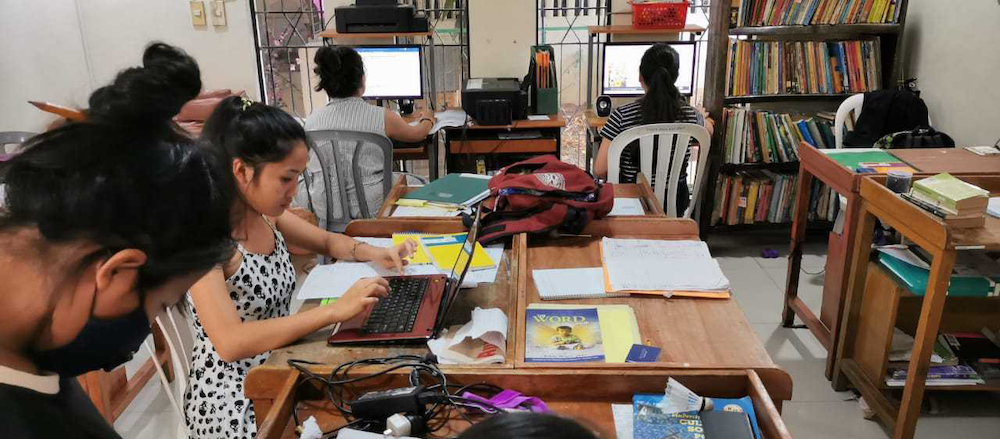
Because of the pandemic, Girls at the School of Life have been taking classes online with computers from donors and help from volunteer tutors. When pandemic restrictions eased, a teacher came twice a week to teach math and history. (Courtesy of the Missionaries of Mary)
ACAY organized an online fundraiser in May 2020 that drew more than 60 participants in France, the Philippines, Brazil, England and the United States and raised enough money to provide food baskets and financial help for more than 40 families, including some ACAY alumni, and help with food costs for the School of Life for three months.
Through email, phone calls and social media, ACAY staff and the sisters have kept in contact with those in the After Care Program, the transition, coaching and monitoring period for young adults after they complete the School of Life or Second Chance programs. This is a critical period: ACAY notes that 92% of participants in the Second Chance program who received after-care coaching between 2009 and 2018 did not go back to detention centers.
During the lockdown, Sister Sophie and three alumnae of the program moved into the School of Life house with 12 girls to quell their anxiety and oversee the many changes required in the program.
With schools closed, the School of Life emphasized other activities and training. Some girls sewed masks in the school's craft shop to donate to workers at a nearby hospital. Others made shawls, jewelry and other handicrafts. They did household chores and gardening, practiced online job interviews and improved their English.
This cohort of girls "has definitely been the most trained group of young girls we ever had," Sister Sophie said. "Trainings tackled their human growth as much as preparing them for self-sustainability and spirituality."
When schools reopened in August, the girls took online classes with volunteer online tutors. As quarantine measures eased, a licensed teacher taught math and history at the house.
After the start of the pandemic, much of the Second Chance program had to be put on hold: Family courts and youth homes would not allow ACAY teams to visit or have personal interactions. But weeks into the lockdown, ACAY worked with the government detention center to arrange daily contact via Zoom with detainees. By September, some of the teens were allowed leave the detention center for a weekend training in the program's office in which Second Chance alumni discussed how ACAY had helped them transform their lives.
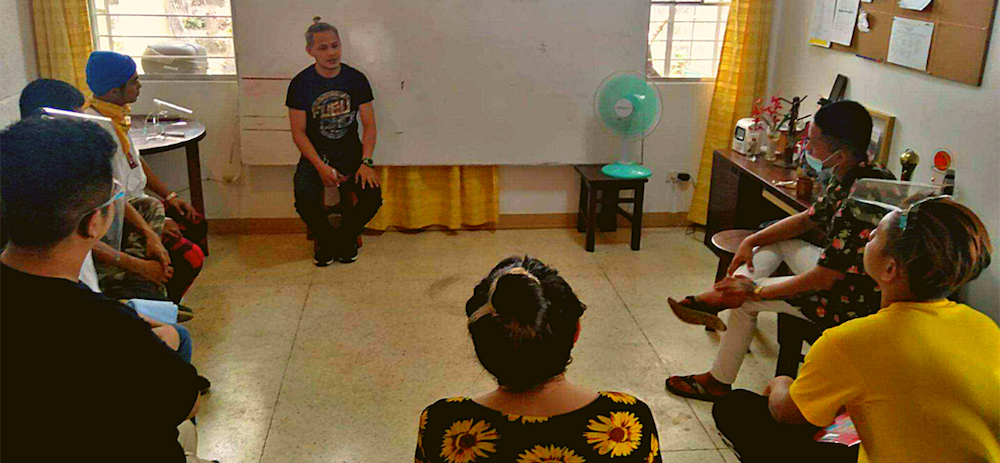
An alumnus of the Second Chance program speaks to the program's current participants at a weekend training at the program's office. (Courtesy of the Missionaries of Mary)
The Second Chance training "has given me a solid foundation," said Louie, 23, who completed the program in December 2020. He asked not to use his last name because he is still in the After Care Program. "I learned proper budgeting for my expenses. I used to buy expensive things when I had money. I learned how cover my expenses and to put money aside for savings. I also learned how to start and manage a business. The road map training gave me direction and a target."
'Everyone is accepted, and all feel at home'
In addition to peer-to-peer connection between alumni and teens currently in the School of Life and Second Chance programs, another foundation of ACAY's approach includes reconnecting the participants with their families and providing family counseling.
"We really believe parents are partners with us, so we integrate them in the recovery journey of the young people," Sister Sophie said.
Participants in the School of Life and Second Chance programs are processing their past experiences, "but if the parents don't do the same, they are left behind," she said.
"It's extremely important that we also involve them into a process for themselves — a process of learning and understanding what they have experienced."
Finding extended families can be a challenge with some of the youth who are orphans, but the effort is worth it, Sister Rachel said. Family members are often found through social media, usually Facebook, she added.
"Belongingness is huge," she said. "It's time-consuming and hard, but nothing compares to the change that happens in the girl when she knows you're with her, trying to locate someone in her family."
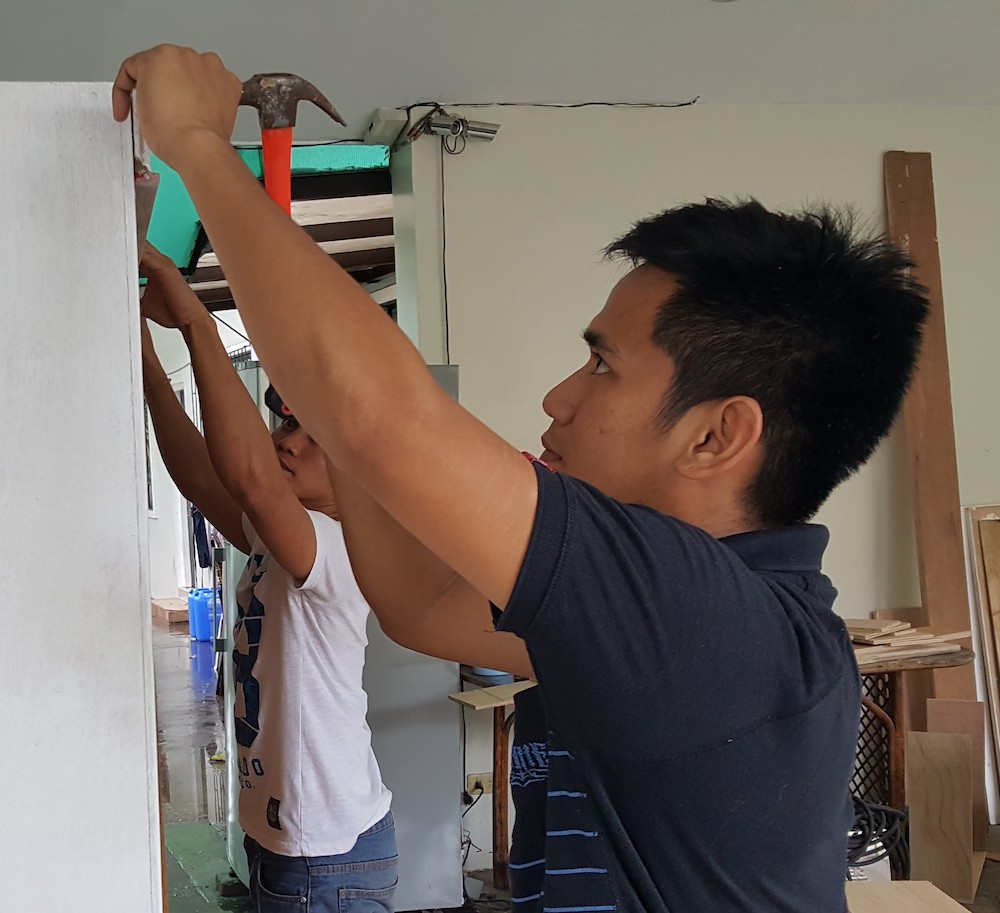
Teen boys and young men in the Second Chance program help build a door for use in the School of Life home in November 2017. Many of the young men learn trade skills as part of the program as well as anger management and other life skills. (GSR photo/Gail DeGeorge)
ACAY's programs include participants of all or no faith backgrounds and offer opportunities to experience God through prayer, personal guidance and times of silence and meditation, Sister Rachel said. Throughout the year, there are retreats and recollections to emphasize a step in the journey for the participants as well as for special liturgical times, such as Holy Week and Advent.
"These are deep and joyful times when the youth dress up, reinforcing a newfound dignity," Sister Rachel said. "Whatever their past and whatever their religion, they belong to the ACAY family. Everyone is accepted, and all feel at home."
Before he became part of that family, Rocky Lumactao spent six years in a detention center beginning when he was 16.
Being part of Second Chance "motivated me that I had a chance to get out, that there was a new lifestyle waiting for me outside," said Lumactao, now 33. "It was good to see that there were still people who believed in you, who trusted you."
The spiritual opportunities strengthened his relationship with God, he added.
After he was released from detention and finished the Second Chance program, he earned a degree in psychology. He now works as a court intervention officer and as a facilitator, teacher and coach for ACAY.
"You don't want to disappoint them," he said of the sisters. "Partly there's gratitude for what they did for you, but on my part, I wanted my life to be an example for others."
Coming March 18: How the ACAY program from the Philippines is being used in France.


